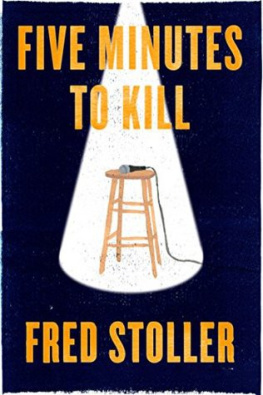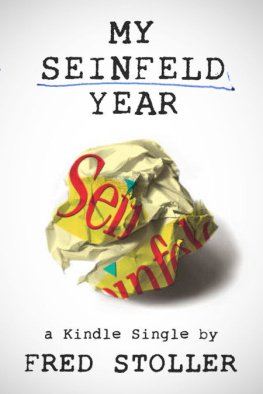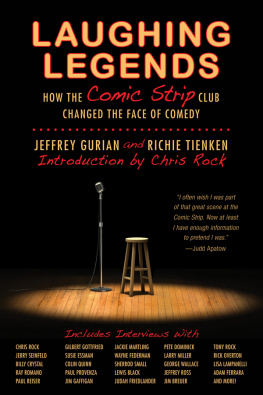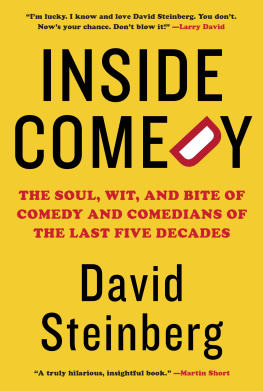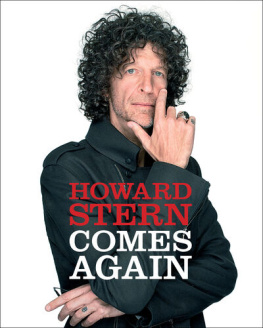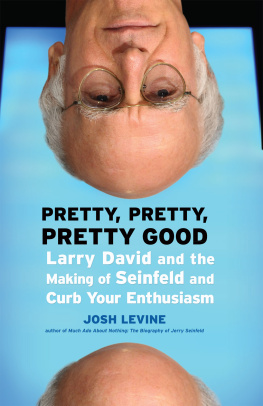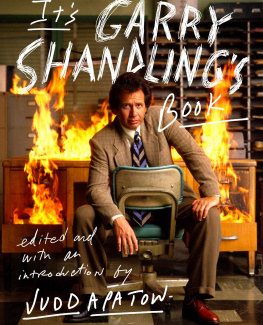
Text copyright 2017 by Fred Stoller
All rights reserved.
No part of this work may be reproduced, or stored in a retrieval system, or transmitted in any form or by any means, electronic, mechanical, photocopying, recording, or otherwise, without express written permission of the publisher.
Published by Amazon Publishing, Seattle
www.apub.com
Amazon, the Amazon logo, and Amazon Publishing are trademarks of Amazon.com, Inc., or its affiliates.
eISBN: 9781542097949
Cover design by Adil Dara
CONTENTS
Chapter One
LATE ARRIVAL
I was running down Third Street in Santa Monica holding three shirts and two pairs of pants, with a sweater-vest draped over my left arm and another shirt I had just dropped on the ground clutched in my right fist. I had worked for eleven years to get to this point, and now I was going to be late to the biggest opportunity of my life. I had no idea what would happen to me if I showed up late, but I really didnt want to find out.
When I finally found the door for the Mayfair Theatre, it was locked, so I pounded on it as if I were being chased by a killer who was about to plunge a knife in my back.
They locked me out, I thought, panicking. Im so late that they decided to go on without me.
At last, the door popped open. Still out of breath, I tried to explain to a lighting technician that I was on the comedy special being filmed there the next night and that I couldnt be late. He glared at me and then stepped aside so I could sidle past him into the theater. My wardrobe flailing, I crashed the stagethink Dustin Hoffman at the end of The Graduate ready to plead my case to the shows producers.
Except, there was no need to rush. I hadnt missed anything. Some of the other comedians hadnt even arrived yet, and the ones that had were just waiting around, looking bored. David Spade, one of the young comics, who looked about fifteen but was twenty-five and always seemed to me cocky as all hell, saw me frazzled with a pile of clothes in my arms and said: Stollers here with his wardrobe. That kills our shot of being the coolest ones here. They should even the playing field, have all of us just wear orange prison jumpsuits.
The others laughed. I tried to calm down, seeing as there was no sense of urgency among the comics or crew. I set my clothes down, said hello to Spade, whom I knew from the Hollywood comedy clubs, and finally got a look at the theater where, the following evening, the six of usDavid, Rob Schneider, Warren Thomas, Jann Karam, Drake Sather, and Iwould each perform a five-minute set on the 13th Annual Young Comedians Show. It was 1989, and, according to HBO, we were the most promising young entertainers in the country.
***
We all undoubtedly wanted to hit a home run: to be the one that stood out, the one launched from it. These specials were huge back then. Each year HBO would scour the clubs throughout the country and find the comedians they felt were the comics on the rise. So many comics got their big break from these showcases, including Jerry Seinfeld, Bob Saget, Sam Kinison, Louie Anderson, and Roseanne Barr.
These specials were always a spectacular event, especially this one, which would be filmed in Santa Monica, California. There was always the excitement of big actors, athletes, or rock stars in attendance. And, of course, powerful agents, managers, showbiz publicists, and lawyers would be there, hoping to nab one or more of the breakouts at the after-party.
I remember hearing the quote that some had attributed to Jerry Seinfeld. He apparently said that an appearance on one of those young comedians specials was the equivalent of ten Tonight Show spots. He was, of course, talking about the power of The Tonight Show starring Johnny Carson. The old Tonight Show with Carson mayve been where America first saw them, but the Young Comedians Show helped cement them in. This was a potentially life-changing opportunity. To kill in comedy means to annihilate, to destroy, to completely own a room. Its the aggressive, warlike term comedians use to simply describe getting as many laughs and applause breaks from a crowd as you can. And we would each have exactly five minutes to do so.
***
Dennis Miller was the host that year. At the time, Miller was known as the smirking anchor on Saturday Night Live. In his own way, he was very animated: giggling, spitting out obscure literary references from the side of his mouth, while tossing his full mullet with a turn of his head or his hand. But I knew him from the New York City clubs as a very quiet guy. Wed crossed paths often but never had so much as a conversation.
Miller was scoping out the ornate stage, most likely preparing his riff on it for his opening monologue in order to toss out what would then seem like off-the-cuff remarks. Meanwhile, I was thinking about what Spade had saidabout my being a fashion threat to him and the others. Obviously, he was being sarcastic. I had no fashion sense at all, nor any sense of coolness. I didnt own a suit. I didnt even own a belt.
Its easy, all these years later, to look back in shame at what a ridiculous, inept person I was, not just about fashion but about everything. In 1989, I was thirty-one. I still didnt know how to pump my own gas or do my own laundry.
And how cool can you be when your inspiration to get into comedy was Jimmie J.J. Walker from Good Times ?
Hey, hes like me, skinny and goofy-looking! Maybe I also could be on TV! I remember saying the first time I saw him.
At least I didnt wear a tight red turtleneck sweater and a big floppy denim hat like my hero.
I saw the wardrobe lady and ran to her.
I may be paranoid, I said, but I think some of the others are laughing at me. Not sure how I should dress for this. I dont know much about belts.
The lovely woman brought me a belt, said shed help me choose something nice to wear, and reassured me I wouldnt be the laughingstock of the specialeven though, come to think of it, that mightve been a good thing.
***
I found myself revisiting the 13th Annual Young Comedians Show some twenty-seven years later, while driving home to my Hollywood apartment in the maddening Friday-afternoon traffic.
I was listening to Marc Maron interview Rob Schneider on his WTF podcast. Ive considered Rob a friend since I relocated from New York to LA in 1988. In the interview, I heard Rob say that his big break came after appearing on the 1989 HBO special that also launched the career of David Spade.
What the fuck! I shouted in my car. I was on that special! Why wasnt it my big break? What did I do wrong? Why wasnt I chosen from it like he and Spade were?
In Hollywood, when you see someone alone in the car next to you moving their lips, its a pretty good bet they are complaining about someone elses success. Thats because if youre in show business, just driving through Hollywood can be a minefield of reminders of how well others are doing. Its as if giant faces of the celebrities on the billboards are whispering to me, Hey, you, in the 2001 Honda Accord with the crappy AC, you re a loser. Are you in a fun, cool project like I am? No! What are you even doing these days?
Sometimes I dont even pull all the way to the red light just to avoid the smug face of someone I started with thats plastered on the side of the bus next to me.
But then, putting it all in perspective, I know there were others on that special who also didnt get what Spade and Schneider got, who might envy my little IMDb page of quirky guest spots and voice-over work.
The names Warren Thomas, Drake Sather, and Jann Karam may not be the most illustrious, but their stories are just as compelling as Davids and Robs. The special created a bond that the six of us share to this daya seminal moment in our lives that, even after all these years, continues to connect us in some small way. For example, Jann Karam called me once to say that Spade had mentioned us on Howard Stern. And besides what that particular special didor didntdo for my own career, I became curious about the others. What were their hopes? What happened to them afterward? Who made it? Who didnt? And what does making it even mean?
Next page
